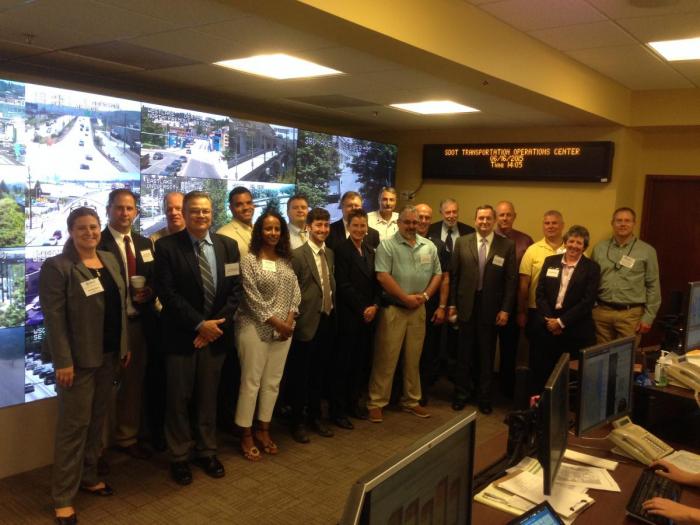Seattle: Peer-to-Peer Workshop
 A truck carrying a load of frozen salmon overturned and blocked all southbound lanes of Hwy 99 on March 24th in the city of Seattle. It took 9 hours to clear the incident, causing rush-hour gridlock and hours-long commutes throughout the city. SDOT had begun a review of its procedures and protocols related to traffic incident management (TIM). The department wanted to improve its mechanisms when responding to unanticipated major events (large collisions, structural failures, etc.) that place a strain on the city's vehicle network. Of particular concern to SDOT was is improving its ability to communicate and strengthen the coordination process with other parties during incidents, including the Seattle Police Department (SPD), the Seattle Office of Emergency Management (OEM), the Seattle Fire Department (SFD), the Washington State Department of Transportation (WSDOT) and other relevant parties.
A truck carrying a load of frozen salmon overturned and blocked all southbound lanes of Hwy 99 on March 24th in the city of Seattle. It took 9 hours to clear the incident, causing rush-hour gridlock and hours-long commutes throughout the city. SDOT had begun a review of its procedures and protocols related to traffic incident management (TIM). The department wanted to improve its mechanisms when responding to unanticipated major events (large collisions, structural failures, etc.) that place a strain on the city's vehicle network. Of particular concern to SDOT was is improving its ability to communicate and strengthen the coordination process with other parties during incidents, including the Seattle Police Department (SPD), the Seattle Office of Emergency Management (OEM), the Seattle Fire Department (SFD), the Washington State Department of Transportation (WSDOT) and other relevant parties.
Seattle Department of Transportation (SDOT), with support from Washington Department of Transportation (WSDOT), requested the Center to host a peer exchange in order to examine and compare their current TIM protocols and practices with national best practices. On June 15th, SDOT conducted a one-day peer exchange between the team of experts assembled by the National Operations Center of Excellence and the officials from various agencies from the city of Seattle. This peer exchange offered SDOT and the City of Seattle an opportunity to learn about the latest techniques in TIM from experts.
Following are some testimonials regarding the workshop:
“The City of Seattle participants were impressed by the NOCoE experts’ deep and impressive backgrounds in transportation, policing, and emergency response. They posed thoughtful questions and shared invaluable insight into traffic incident management. We were struck by how the mere act of telling a panel of experts about Seattle’s process revealed the areas where our system must improve. When the experts combined what they heard from our participants with their own reflections and expertise, they came up with really powerful observations … and yield the best result for the people of Seattle.
Scott Kubly
Director, City of Seattle Department of Transportation
“The National Operations Center of Excellence lived up to its goals of "best practice peer exchange" and "assistance to states and other organizations to identify best practice." We were privileged with a national team of experts from the police, DOT, fire and FHWA sides in Traffic Incident Management for the workshop in Seattle on Tuesday June 16, 2015”
Sam Samuel I. Schwartz, P.E. President + CEO
_________
“Thanks for the feedback and the special opportunity to visit the City of Seattle. The group was amazing and generated significant, solution based discussion and recommendations for City leadership to consider. I know the group was impressed with the forward thinking of the City of Seattle to look for solutions that meet their specific needs now and in the future. I also want to thank you and the NOCoE for taking a leadership role in providing this peer exchange and the opportunity for all of us to improve our operations within our own states and regions”
Tim Lane
___________
“I thought the exchange of best practices was both a benefit to the agencies and ourselves. By continuing these NOCoE sessions across the country, it will raise the level of performance and accomplish what you intended. You created a great opportunity for the industry and I’m glad to see it start successfully”
Patrick McGowan